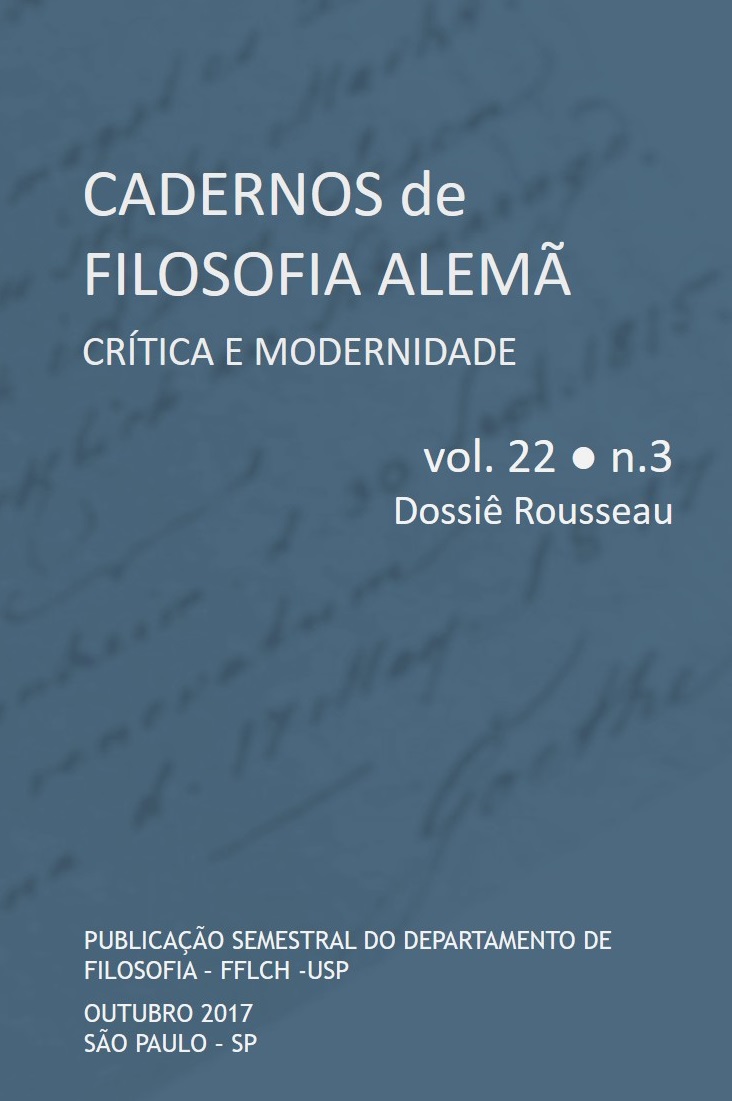Philosophical history against Rousseau
DOI:
https://doi.org/10.11606/issn.2318-9800.v22i3p91-106Keywords:
history, conjecture, savage, eloquenceAbstract
The aim of the article is to show how philosophical history, as conceived in the Enlightenment, was used as a kind of weapon against the conjectural method as delineated by Rousseau in the second Discourse. A prime example of such a strategy is William Robertson’s History of America, in which the savage American is taken as a type for natural man that, as such, is part of a general theory of the development of society through stages. The theoretical and critical qualities of Robertson’s work did not escape Edmund Burke, its first and prominent reader.Downloads
References
Buarque de Holanda, S. (1974). “’Prefácio’ a Maria Odila da Silva Dias”. In: O fardo do homem branco. São Paulo: Companhia Editora Nacional (Brasiliana).
Buffon, G-L. (2008). «Des époques de la nature». In: S. Schmitt (ed.). Oeuvres de Buffon. Gallimard/Pléiade.
Burke, E. (1759). “An account of the books for the year 1759”. In: Annual register for the year 1759. Eighteenth Century collections on line.
____________. (1762). “An account of the books for the year 1762”. In: Annual register for the year 1762. Eighteenth Century collections on line.
____________. (1958). The correspondence of Edmund Burke, vol. I. T. W. Copeland (ed.). Cambridge: Cambridge University Press.
____________. (1961). The correspondence of Edmund Burke, vol. III. George Guttridge (ed.). Cambridge: Cambridge University Press.
____________. (1990). Philosophical inquiry into the original of our ideas of the sublime and the beautiful. Adam Phillips (ed.). Oxford: Oxford University Press.
____________. (1993). Reflections on the revolution in France. L. G. Mitchell (ed.). Oxford: Oxford University Press.
____________. (2008). An abridgement of English history. New York: Cosimo Classics.
____________. (2009). Pre-revolutionary writings. Ian Harris (ed.). Cambridge: Cambridge University Press.
____________. (2012). Lettre à un member de l’assemblée nationale sur la revolution française et Rousseau. Patrick Thierry (ed.). Paris: Mille et une Nuits.
Cícero. (2008). The republic and the laws. Translated by Niall Rudd. Oxford: Oxford University Press.
Foucault, M. (1966). Les mots et les choses. Une archéologie des sciences humaines. Paris: Gallimard.
Gibbon, E. (2014). Ensaios de história. Tradução de P. P. Pimenta. São Paulo: Iluminuras.
Hargraves, N. (2002). The progress of ambition. Character, narrative and philosophy in the works of William Robertson. Journal of the history of ideas, 63(2), pp.261-282.
Hume, D. (1983). The history of England from the invasion of Julius Caesar to the Revolution. 6 vols. William B. Todd (ed.). Indianapolis: Liberty Fund.
____________. (1985). Essays, moral, political, and literary. E. F. Miller (ed.). Indianapolis: Liberty Fund.
____________. (1978). Philosophical essays concerning human understanding, ed. fac-símile. Hildesheim/Nova York: Olms Verlag.
Locke, J. (1978). An essay concerning human understanding. P. H. Nidditch (ed.). Oxford: Clarendon Press.
Monteiro, D. L. (2012). Anarquia e Conformação das Coisas: algumas observações sobre revolução, história e linguagem em Edmund Burke. Dois Pontos 8(1), pp.11-22.
Pimenta, P. P. (2012). “O filósofo no espelho. Hume, Rousseau e d’Alembert”. In: A imaginação crítica. Hume no Século das Luzes. Rio de Janeiro: Azougue.
Pococok, J. G. (2001). A. Barbarism and religion vol. 2. Narratives of civil government. Cambridge: Cambridge University Press.
Prado Jr., B. (2008). A retórica de Rousseau. São Paulo: CosacNaify.
Robertson, W. (1762). “A view of the progress of society”. In: The history of Charles V (1762). Eighteenth Century Collections online.
____________. (1977). The history of America (1777). Eighteenth Century Collections online.
Rousseau, J. J. (1981). Discours sur l’origine et les fondements de l’inegalité parmi les hommes. Braunstein (ed.). Paris: Nathan.
____________. (1993). Essai sur l’origine des langues. Catherine Kintzler (ed.). Paris: Flammarion.
Stewart, D. (1802). Account of William Robertson. In: The works of William Robertson. 2a ed. Londres.
Whiters, C. J. (2007). Placing the Enlightenment: thinking geographically about the age of reason. Chicago: University of Chicago Press.
Downloads
Published
Issue
Section
License
Information and conceptions on the texts are complete responsibility of the authors.
All the articles submitted before July 5th 2018 and those published after July 2021 are licensed under a CC BY-NC-ND license – except those published between the aforementioned dates, which are under the CC BY-NC-SA license. The permission for the translation of the material published under the license CC BY-NC-ND by third parts can be obtained with the consent of the author.
Open access policies - Diadorim
Rules applied before July 5th 2018:
Presenting a submission to our Editorial Board implies granting priority of publication for “Cadernos de filosofia alemã”, as well as transferring the copyright of texts (once published), which will be reproduced only with the manifest authorization of the editors. Authors keep the right to reuse the texts published in future editions of their work, without paying any fees to "Cadernos”. We will not grant the permission to re-edit or translate the texts for third parts without agreement of the author.


